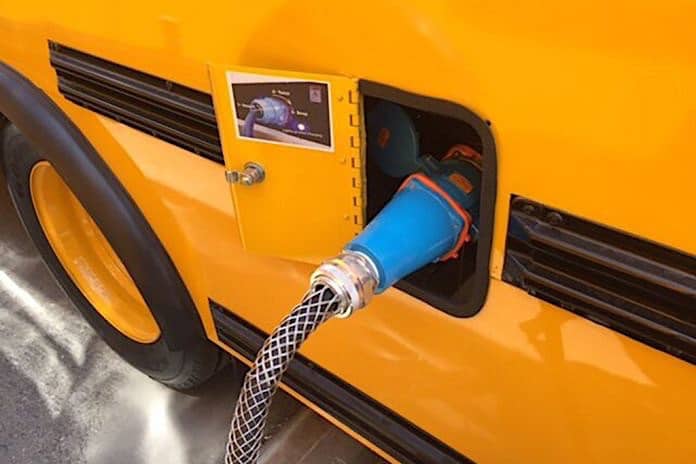The Florida Department of Environmental Protection is in the first phase of replacing older diesel buses with electric or alternative fuel school buses in Florida via the Volkswagen Mitigation Trust Fund.
The environmental department set aside $5 million for the first bus replacement cycle to benefit two school districts.
A new webinar hosted by the Florida Conversation Voters Education Fund, “Electrify Your County’s School Bus Fleet,” discussed VW allocation and the positive impact electric school buses have on the environment.
Florida received a total of $166 million in VW money to help offset statewide emissions of nitrogen oxides, or NOx. The VW money was made available to states after the 2015 Volkswagen emissions cheating scandal.
The first webinar, in what is designed to be a series, commenced Tuesday with speaker John Paul Fraites, who is a program consultant for the Division of Air Resource Management at the Florida Department of Environmental Protection. Fraites discussed the usage goal of the funding money and how the state is planning to delegate the money.
Fraites explained that 70 percent of the $166 million that is available, or approximately $116 million, is earmarked for replacing fund school, transit and shuttle buses. Fifteen percent of the total funds are for electric vehicle charging infrastructure, with the remaining 15 percent to be used for the continued involvement in the Diesel Emissions Reduction Act (DERA) federal grant program.
Florida will fund a minimum of five and a maximum of 10 school buses per each awarded district. For the first round of replacements, Fraites said the department is covering 100 percent of the cost. This is to better understand the entire process of identifying, acquiring, and implementing electric vehicles and their infrastructure, he explained.
When school districts are considering submitting applications, Fraites noted there are qualifications. The basic requirements seek to replace 2009 model-year school buses or older. He noted the model year is based on the manufacture year of the engine and not the body of the bus.
The engine to be replaced must also be a diesel-powered engine, and the school district must agree to permanently disable the diesel-powered school bus once it’s been replaced. Only compressed natural gas or propane-powered engines will be considered for alternative-fuel replacements.
Fraites also discussed other conditions when asking for funding money, including working with a public utility to determine if a district has the necessary infrastructure for installing the charging stations. He said districts need to determine if a Level 2 or Level 3 charging structure would best suit their needs.
A Level 2 charging station uses a 240-volt power source, which is similar to the one that is used for an oven or clothes dryer. A Level 3 charging station uses very high voltage and can add 90 miles of range to an EV in as quick as half an hour. However, he warned that Level 3 charging stations tend to degrade an electric vehicle’s battery faster than a lower charge.
He said that a Level 2 will provide enough energy for the school buses to recharge overnight and in the morning, noting that the bus will run efficiently for the morning and afternoon routes. Fraites did recommend that districts install one charging structure per vehicle, to make sure that all-electric vehicles can be charged at one time.
Related: Virginia Earmarks $20M in VW Funds to Spur Electric School Bus Growth
Related: Indiana’s VW Environmental Mitigation Trust Awards $9.8 million
Related: Latest German Diesel Auto Parts Manufacturer Fined for VW Scandal Role
Related: Last of Arizona VW Settlement Money Goes to Rural School Districts
Related: Report: Using VW Money to Buy Diesel School Buses is a Wasted Opportunity
Olivia Nedd, a community organizer for the Florida Conversation Voters, discussed the health benefits for children when switching to electric-powered vehicles and the costs that are associated.
While the initial purchase cost of an electric vehicle can be over three times that of a comparable diesel school bus, she said an EV can provide lifetime fuel and maintenance cost savings as high as $170,000. She noted that over time, electric school buses are going to be more cost-effective.
Nedd also mentioned the health benefits associated with going electric. Electric buses, she added, feature zero tailpipe emissions that provide an overall healthier environment.
She concluded the webinar by encouraging districts to research other funding sources to finance their vehicles in the future.














